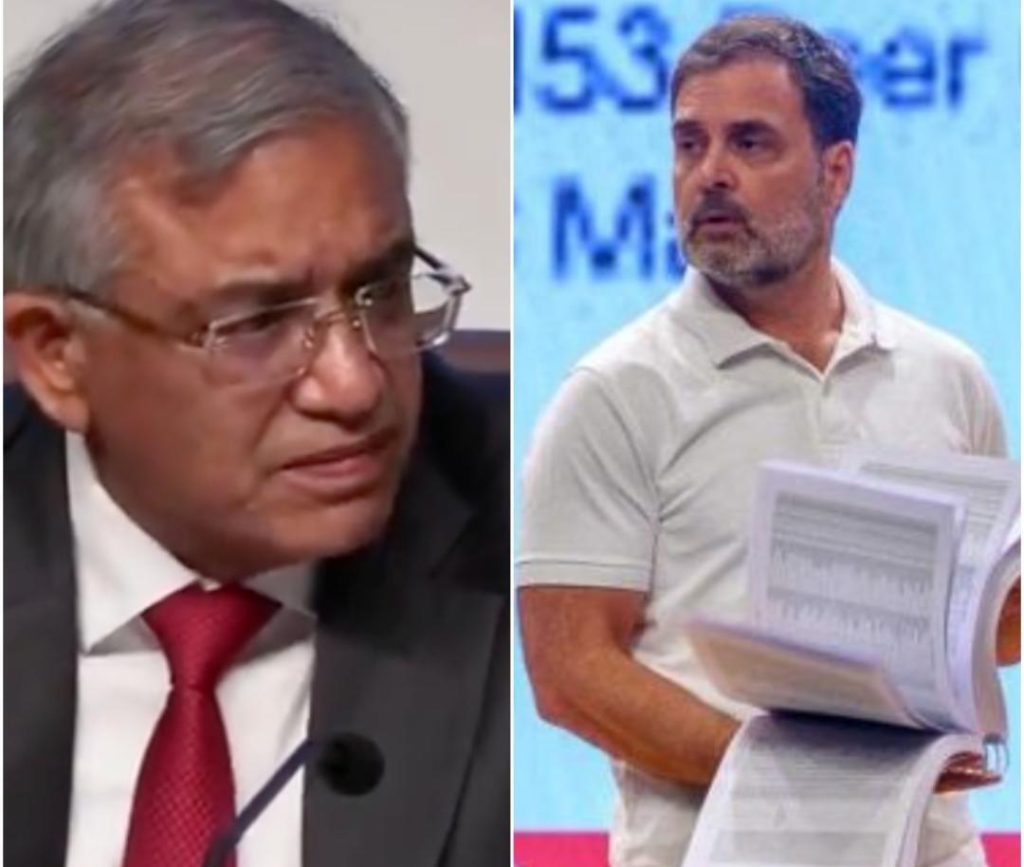
Title: “Vote Chori” Phrase an Insult; Should We Share CCTV Footage of Mothers & Sisters Voting?: EC
The “vote chori” phrase, which translates to “voting theft” or “vote theft,” has become a contentious issue in the ongoing Indian electoral process. The phrase has been used by Congress leader Rahul Gandhi to claim that elections are rigged, but it has been met with criticism from the Election Commission of India (ECI). The Chief Election Commissioner, Gyanesh Kumar, has termed the phrase an insult to the Constitution and has raised concerns about the privacy of voters.
The controversy surrounding the “vote chori” phrase began when Rahul Gandhi used it to accuse the ruling Bharatiya Janata Party (BJP) of tampering with the electoral process. Gandhi alleged that the BJP was using its influence to manipulate the votes and rig the elections. The BJP, however, denied the allegations and termed Gandhi’s claims as baseless.
The ECI, which is responsible for conducting free and fair elections in India, has taken umbrage with the “vote chori” phrase. Gyanesh Kumar, the Chief Election Commissioner, has said that the phrase is an insult to the Constitution and the democratic process. Kumar has also raised concerns about the privacy of voters and has questioned whether it is necessary to share CCTV footage from polling booths to prove that elections are free and fair.
The ECI has pointed out that surveillance footage from polling booths is already available and can be accessed by voters who want to verify the authenticity of the electoral process. However, Kumar has emphasized that the privacy of voters, including their mothers and sisters, must be respected. He has asked whether it would be appropriate to share the CCTV footage of any voter, including their mothers, daughters-in-law, and other family members.
Kumar’s concerns about voter privacy are well-founded. The ECI has been working hard to ensure that the electoral process is free and fair, and sharing CCTV footage of voters, including their mothers and sisters, could compromise their privacy. The ECI has already taken several measures to ensure the security and confidentiality of the electoral process, including the use of electronic voting machines and the deployment of security personnel at polling booths.
Despite the ECI’s concerns, some political parties and individuals have demanded that the CCTV footage from polling booths be shared to prove that elections are free and fair. They argue that the footage will help to build trust in the electoral process and will prevent any attempts to rig the elections.
However, the ECI has refused to share the CCTV footage, citing concerns about voter privacy. Kumar has emphasized that the ECI is committed to ensuring the secrecy of the voting process and that sharing CCTV footage would compromise this secrecy. He has also pointed out that the ECI has already taken several measures to ensure the transparency and accountability of the electoral process, including the use of randomized audits and the deployment of observers at polling booths.
The controversy surrounding the “vote chori” phrase and the demand for sharing CCTV footage from polling booths has raised important questions about the conduct of elections in India. It highlights the need for political parties and individuals to respect the democratic process and to refrain from using divisive language that can create tension and mistrust among voters.
In conclusion, the “vote chori” phrase is an insult to the Constitution and the democratic process. The ECI has taken the right decision by refusing to share CCTV footage from polling booths, citing concerns about voter privacy. The ECI has been working hard to ensure that the electoral process is free and fair, and sharing CCTV footage would compromise this effort. Political parties and individuals must respect the democratic process and refrain from using divisive language that can create tension and mistrust among voters.






